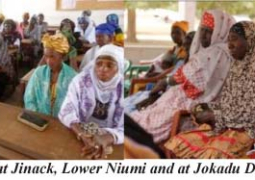The forum held at GOVI hall in Kanifing was characterised with presentations and plenary sessions aimed at raising awareness for both young women and men.
It also aimed at not only protecting girls and young women and giving them a voice that seeks to promote the involvement of men and boys in prevention of violence.
In delivering her opening statement, Haddy Mboge Barrow, coordinator of Network on Gender Based Violence, said the theme for this year’s celebration is ‘From Peace in the Home to Peace in the World: Let’s Challenge Militarism and End Violence against Women.’
She said the16 Days of Activism against Gender Based Violence is commemorated yearly around the globe for awareness creation and triggering action on ending this pervasive human rights violation (UN Women, 2012).
Originating from the first women global leadership institute coordinated by the centre for women’s global leadership in 1991, the 16 days of activism occurred during the commemoration of other significant dates that are equally related to gender-based violence or human rights, she said.
According to her, in The Gambia, like elsewhere in the world, the 16 Days Campaign has been used as an organised strategy by individuals, groups and institutions to call for the elimination of all forms of violence against women.
She highlighted what constitute gender-based violence, saying it is an umbrella term used to describe any harmful acts perpetrated against a person’s will.
Madam Haddy Mboge Barrow went on to mention that the United Nations Declaration on the elimination of violence against women as any act of gender-based violence that results in, or is likely to result in, physical, sexual or psychological harm or suffering to women, including threats of such acts, coercion or arbitrary deprivation of liberty, whether occurring in public or in private, constitute gender-based violence.
This definition includes violence occurring in the family, within the general community, and violence perpetrated or condoned by the State. Forms of GBV against women include but are not limited to, domestic violence, sexual abuse and rape, sexual harassment, trafficking in women, forced prostitution, and harmful traditional practices.
She spoke extensively on the giant strives made by The Gambia in ending gender-based violence such as signing and ratifying various international conventions and protocols, and their domestications.
Sait Matty Jaw, in his presentation, said violence against women and girls is a problem of pandemic proportions and violations of human rights.
He added that many young women and girls experience physical or sexual violence from men in their life time the majority by husbands, intimate partners or someone they know.
He said the most common form of violence experienced by women globally is physical violence inflicted by an intimate partner, with women beaten, coerced into sex or otherwise abused.
Therefore involving men in the fight against the menace will greatly reduce the inhumane act, he added.
“It is against this background that Think Young Women, The University of The Gambia Students Union and Youth Action Movement decided to come together to organize this event with the primary intention to engage men and young men in particular to stand up and commit to end violence against women,” he said.
According to him, eliminating violence against women should be everyone’s moral duty. “We must dismantle belief systems, social structures, and institutional practices that oppress women and dehumanize men themselves,” he noted.
Mr Jaw therefore thanked the organizing committee, Youth Action Movement, the University of The Gambia Students Union and everyone present at the event for marking the day with them.
It’s about time now men and women united to eliminate violence against women while calling on all to pledge and commit ourselves, time and resources to end violence against women.



